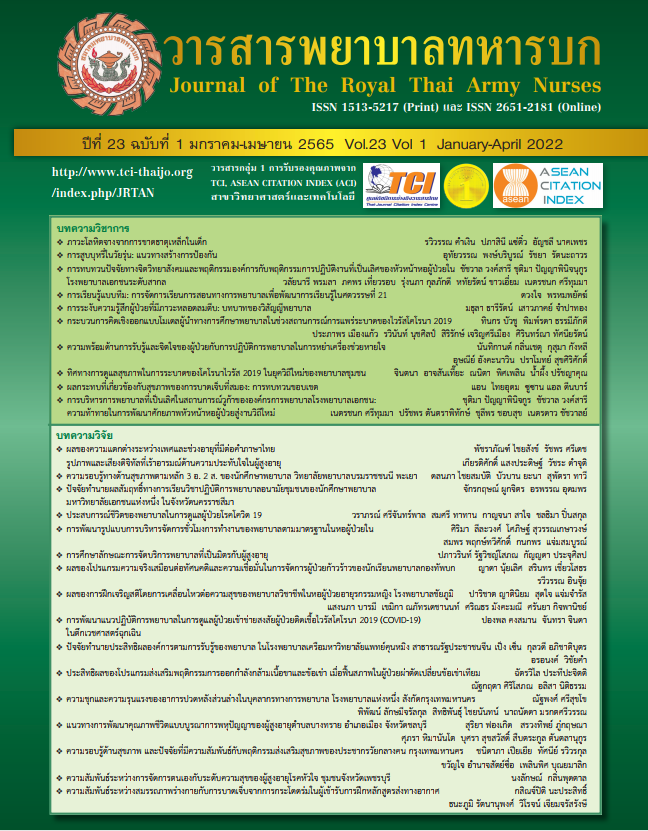The Development of Promote Inhibitory Control in School Age Children
Keywords:
Inhibitory control, Neuro-Linguistic Programming, Anchoring, School age childrenAbstract
The aims of this research were to development and to examine the effectiveness of the inhibitory control training program based on NLP (ICT-NLP). The sample consisted of 56 school age children, with the aged 7 - 11 years. They were randomly assigned by using the matched paired into two groups: an experimental and a control group. Each group consisted of 28 students. The research instruments were; 1) the ICT-NLP, which was developed by the researcher and 2) the Go/ No-go task. The experimental group received the ICT-NLP program 2 sessions and the control group joined the regular school activates during the same period. The assessments were done in 2 phases: pretest and posttest. The data were analyzed by a t-test. The results were that; the experimental group had the inhibitory control the posttest higher than the pretest with statistically significant at .05 level, and higher than those in the control group with statistically significant at .05 level.
Downloads
References
Haenjohn J. Cognitive psychology (2sd ed.). Bangkok: Grandpoint; 2019. (In Thai)
Barkley RA. Behavioral inhibition, sustained attention, and executive functions: Constructing a unifying theory of ADHD. Journal of Psychological Bulletin 1997; 121:65-94.
Wirt T, Hundsdorfer V, Schreiber A, Kesztyus D, Steinacker JM. Associations between inhibitory control and body weight in German. Journal of Science Direct 2014;12: 335-42.
Marquez C, Poirier GL, Cordero MI, Larsen MH, Groner A, Marquis J, Magistretti PJ, Trono D, Sandi C. Peripuberty stress leads to abnormal aggression, altered amygdala and orbitofrontal reactivity and increased prefrontal MAOA gene expression. Journal of Translational Psychiatry 2013;3:1-12.
Worakit Pokharat S, Yongyuan B, Thanyansilp S. 10 years, a decade for children and the wisdom of the family. New paradigm to develop the potential of Thai children in the next decade. Nakhon Pathom: National Institute for Child and Family Development Mahidol University; 2008. (In Thai)
Diamond A. Whether coordinative (soccer) exercise improves executive functioning in kindergarten children has yet to be demonstrated. Journal of Brain Res 2014;4:232-46.
Miyake A, Friedman NP, Emerson MJ, Witzki AH, Howerter A, Wager TD. The unity and diversity of executive functions and their contributions to complex “frontal lobe” tasks: A latent variable analysis. Journal of Cognitive Psychology 2000;41:49-100.
Haenjohn J. Neuro-linguistic programming [NLP]: application for counseling, learning, and Business. Chonburi: Get Good Creation; 2014. (in Thai)
Bezdjian S, Baker LA, Lozano DI, Raine A. Assessing Inattention and impulsivity in children during the Go/ No-Go Task. Journal of Applied Developmental Psychology 2009; 27:365-83.
Pityaratstian N, Booranasuksakul T, Juengsiragulwit D, Benyakorn S. ADHD Screening Properties of the Thai Version of Swanson, Nolan, and Pelham IV Scale (SNAP-IV) and Strengths and Difficulties Questionnaire (SDQ). Journal of Psychiatr Assoc Thailand 2014;59:97-110.
Sriwongpanich N. Mental retardation/Intellectual disabilities. Journal of Rajanukul Institute 2009; 24:31-56.
Taylor MJ, Doesburg SM, Pang EW. Neuromagnetic vistas into typical and atypical development of frontal lobe functions. Journal of Hum Neurosci 2014;8:453-86.
Sooksawat P, Haenjohn J, Suthithatip S. Effects of Nero-Linguistic Programming counseling on resilience of disadvantaged students. Ratchaphruek Journal 2015;13:103-10.
Prohmpetch W, Haenjohn J, Inchai P, Chaywimol R. The Effects of Neuro-Linguistic Programming in Student with PTSD, Depression, and Complicated Grief under Civil Unrest in the Three Border Province, Southern Thailand. Institute of Research and Development for Health of Southern, Thailand: Prince of Songkla University; 2008. (in Thai).
Suyajai P. The effect of buddhist group counseling on developing reasoned attention and self - regulation of students by Neuro Linguistic Programming (NLP) in the psychotherapy. Mahachula Academic Journal 2019;6:95-111. (in Thai)
Panyencheun W, Haenjohn J, Sirithadakunlaphat S. Development of program to promote attention based on Neuro-Linguistic Programming in primary school students. Journal of The Royal Thai Army Nurses 2019;20:305-312. (in Thai)
Nocross JC, Koocher GP, Garofalo A. Discredited psychological treatments and tests: A delphi poll. Journal of Professional psychology 2006;37:515-22.
Singh A, Abraham A. Neuro linguistic programming: A key to business excellence. Journal of Total quality management and business excellence 2008;19:141-49.
Tulkamtoei T, Haenjohn J. The effects of NeroLinguistic Programming counseling on stress of child sexual abused. Journal of the Police Nurses 2018;10:226-32.
Lashkarian A, Sayadian S. The effect of Neuro Linguistic Programming (NLP) Techniques on young iranian EFL learners’ motivation, learning improvement, and on teacher’s success. Journal of Science Direct 2015;12: 510-16.
Downloads
Published
How to Cite
Issue
Section
License
Copyright (c) 2022 Journal of The Royal Thai Army Nurses

This work is licensed under a Creative Commons Attribution-NonCommercial 4.0 International License.
บทความหรือข้อคิดเห็นใดใดที่ปรากฏในวารสารพยาบาลทหารบกเป็นวรรณกรรมของผู้เขียน ซึ่งบรรณาธิการหรือสมาคมพยาบาลทหารบก ไม่จำเป็นต้องเห็นด้วย
บทความที่ได้รับการตีพิมพ์เป็นลิขสิทธิ์ของวารสารพยาบาลทหารบก
The ideas and opinions expressed in the Journal of The Royal Thai Army Nurses are those of the authors and not necessarily those
of the editor or Royal Thai Army Nurses Association.






